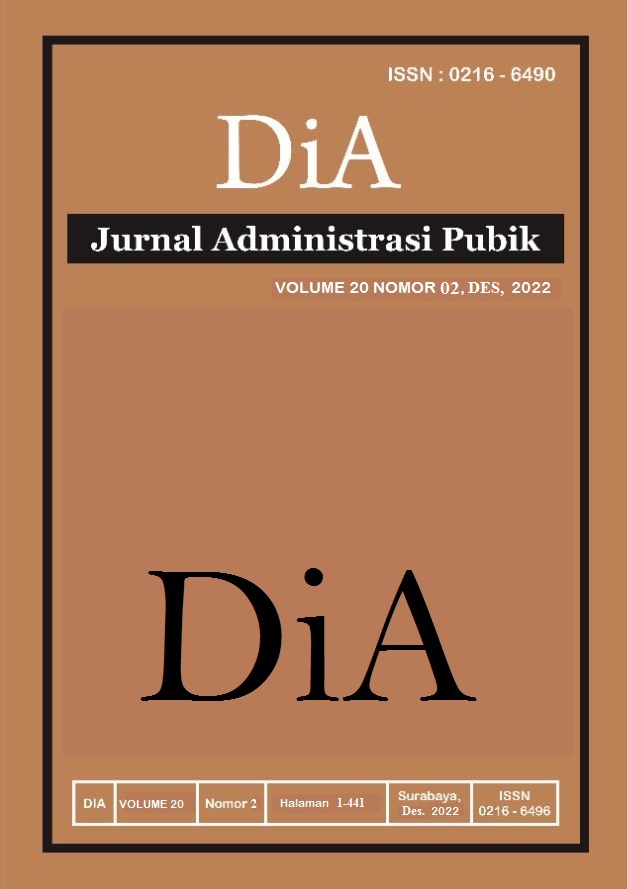LOCAL GOVERNMENT CAPACITY IN IMPLEMENTING SINGLE-USE PLASTIC BAN POLICY IN BALI PROVINCE
DOI:
https://doi.org/10.30996/dia.v20i02.6663Keywords:
Local Government Capacity, Policy Implementation, Single Use Plastic Ban, Bali ProvinceAbstract
Inorganic waste, especially single-use plastic, has a negative impact on the environment and society. The trend of increasing plastic production is not followed by the ability to manage waste properly. As a result, there is a buildup of waste in the world. Indonesia is one of the countries with the highest plastic waste problem. The problem of plastic waste can harm a country such as decline in the tourism sector. Bali Province is one of the provinces with tourism potential. Plastic waste is also a problem there. Several international media such as Time and BBC have reported about this situation. In response to this problem, the local government published Peraturan Gubernur Bali Nomor 97 Tahun 2018 which prohibits the use of three types of single-use plastic, namely plastic bags, styrofoam, and straws. In its implementation, there is problem in public compliance, can find people use single plastic easily. This research contributes the analysis of local government capacity in implementing the policy. As a result, local governments are lacking in monitoring and sanctioning, causing a decrease in community compliance. However, they are strong enough in explaining the concept and causality relationship to achieve the goal.
Downloads
References
Alimudin, R. (2021, Januari 1). Pikiran Rakyat. Diambil kembali dari Didominasi Sampah Plastik, Petugas Gabungan Angkut 30 Ton Sampah dari Pantai Kuta: https://bekasi.pikiran-rakyat.com/nasional/pr-121199303/didominasi-sampah-plastik-petugas-gabungan-angkut-30-ton-sampah-dari-pantai-kuta?page=2
Bali Express. (2019, Oktober 22). Bali Express. Diambil kembali dari Sampah Plastik Makin Merongrong, DLH Karangasem Pikir-pikir: https://baliexpress.jawapos.com/bali/22/10/2019/sampah-plastik-makin-merongrong-dlh-karangasem-pikir-pikir
BBC.com. (2018, Maret 7). Bali's battle against plastic pollution. Diambil kembali dari bbc.com: https://www.bbc.com/news/world-asia-43312464
CNN Indonesia. (2021, Januari 2). CNN Indonesia. Diambil kembali dari Eks Wamenlu Keluhkan Sampah di Pantai Legian: Buruk Sekali: https://www.cnnindonesia.com/gaya-hidup/20210102193519-269-588782/eks-wamenlu-keluhkan-sampah-di-pantai-legian-buruk-sekali
Cocklin, C. (2009). Environmental policy. Dalam R. Kitchin, & N. Thrift, International Encyclopedia of Human Geography (hal. 540-545). Townsville: Elsevier .
Detik.com. (2011, April 5). Time Sebut Bali 'Neraka', Pemprov Bali Protes. Diambil kembali dari Detik.com: https://news.detik.com/berita/d-1609288/time-sebut-bali-neraka-pemprov-bali-protes
Detik.com. (2022, April 18). Koster Segera Tutup TPA Suwung. Diambil kembali dari Detik.com: https://www.detik.com/bali/berita/d-6037620/koster-segera-tutup-tpa-suwung
Filho, W. L., Salvia, A. L., Minhas, A., Paço, A., & Dias-Ferreira, C. (2021). The COVID-19 pandemic and single-use plastic waste in households: A preliminary study. Science of The Total Environment. doi:doi.org/10.1016/j.scitotenv.2021.148571
Godfrey, L. (2019). Waste Plastic, the Challenge Facing Developing Countries—Ban It, Change It, Collect It? Recycling, 3. doi:10.3390/recycling4010003
Hill, M., & Hupe, P. (2002). Implementing Public Policy. London: SAGE Publications.
Lamb, K. (2018, Maret 6). 'Plastic, plastic, plastic': British diver films sea of rubbish off Bali. Diambil kembali dari The Guardian: https://www.theguardian.com/world/2018/mar/06/plastic-british-diver-films-sea-rubbish-bali-indonesia
Liputan6. (2021, Januari 11). LIPI: Jumlah Sampah Plastik Melonjak selama Pandemi Covid-19. Diambil kembali dari Liputan.com: https://www.liputan6.com/bisnis/read/4454386/lipi-jumlah-sampah-plastik-melonjak-selama-pandemi-covid-19
Marshall, A. (2011, April 9). Holidays in Hell: Bali's Ongoing Woes. Diambil kembali dari Time: http://content.time.com/time/world/article/0,8599,2062604,00.html
McIlgorm, A., Campbell, H. F., & Rule, M. J. (2011). The economic cost and control of marine debris damage in the Asia-Pacific region. Ocean & Coastal Management, 54(9), 643-651. doi:10.1016/j.ocecoaman.2011.05.007
Meijer, L. J., van Emmerik, T., van der Ent, R., Schmidt, C., & Lebreton, L. (2021). More than 1000 rivers account for 80% of global riverine plastic emissions into the ocean. Science Advances, 7(18). doi:doi:10.1126/sciadv.aaz5803
Murniati, N. (2020, November 11). Kepala Seksi Pengelolaan sampah Dinas Lingkungan Hidup Kabupaten Karangasem. (L. D. Suriyani, Pewawancara) Dipetik 18 11, 2021, dari https://www.mongabay.co.id/2020/11/11/bali-kesulitan-mengurangi-plastik-sekali-pakai/
Nugrahani, F. (2014). Metode Penelitian Kualitatif. Surakarta: Cakra Books.
Pülzl, H., & Treib, O. (2007). Implementing Public Policy. Dalam F. Fischer, G. J. Miller, & M. S. Sidney, Handbook of Public Policy: Theory, Politics, and Methods. New York: CRC Press, Taylor & Francis Group.
Purnaya, I. G., & Semara, I. M. (2018). Implementasi Kebijakan Pemerintah Terhadap Penataan Sungai Badung Dalam Upaya Pengembangan Pariwisata di Kota Denpasar. Jurnal Ilmiah Hospitality Management, 1-10. doi:10.22334/jihm.v8i2.132
Radarbali.id. (2021, Mei 9). Radarbali.id. Diambil kembali dari Konsumsi Kantong Plastik Naik, Pemprov Bali Panggil Pengelola Pasar: https://radarbali.jawapos.com/read/2021/05/09/260344/konsumsi-kantong-plastik-naik-pemprov-bali-panggil-pengelola-pasar
Ritchie, H., & Roser, M. (2018, September). Plastic Pollution. Diambil kembali dari Our World in Data: https://ourworldindata.org/plastic-pollution
Sharp, E. B., Daley, D. M., & Lynch, M. S. (2010). Understanding Local Adoption and Implementation of Climate Change Mitigation Policy. Urban Affairs Review, 433–457. doi:10.1177/1078087410392348
SIPSN. (2020, - -). SIstem Informasi Pengelolaan Sampah Nasional. Dipetik November 25, 2021, dari Grafik Komposisi Sampah: https://sipsn.menlhk.go.id/sipsn/
Suriyani, L. D. (2020, November 11). Bali Kesulitan Mengurangi Plastik Sekali Pakai. Diambil kembali dari MONGABAY: Situs Berita Lingkungan: https://www.mongabay.co.id/2020/11/11/bali-kesulitan-mengurangi-plastik-sekali-pakai/
The Jakarta Post. (2019, Januari 17). Microplastics have entered our bodies via food chain: Scientist. Diambil kembali dari The Jakarta Post: https://www.thejakartapost.com/news/2019/01/17/microplastics-have-entered-our-bodies-via-food-chain-scientist.html
Tribunnews.com. (2021, Januari 4). Pantai di Bali Dipenuhi Sampah Plastik Selama Musim Hujan, Capai 30-60 Ton Setiap Hari. Diambil kembali dari Tribunnews.com: https://www.tribunnews.com/regional/2021/01/04/pantai-di-bali-dipenuhi-sampah-plastik-selama-musim-hujan-capai-30-60-ton-setiap-hari
United Nation Environment Programme. (2018). Our planet is drowning in plastic pollution—it's time for change! Dipetik November 19, 2021, dari United Nation Environment Programme: https://www.unep.org/interactive/beat-plastic-pollution/
United Nations Environment Programme. (2018). SINGLE-USE PLASTICS: A Roadmap for Sustainability. United Nations Environment Programme.
Vanapalli, K. R., Sharma, H. B., Ranjan, V. P., Samal, B., Bhattacharya, J., Dubey, B. K., & Goel, S. (2021). Challenges and strategies for effective plastic waste management during and post COVID-19 pandemic. Science of The Total Environment. doi:10.1016/j.scitotenv.2020.141514
Wahab, S. A. (2005). Analisis kebijaksanaan: Dari formulasi ke implementasi kebijaksanaan negara. Jakarta: Bumi Aksara.
World Economic Forum. (2020). Radically Reducing Plastic Pollution in Indonesia: A Multistakeholder Action Plan National Plastic Action Partnership. Cologny/Geneva: World Economic Forum.
Downloads
Published
How to Cite
Issue
Section
License
The DiA journal allows authors to retain the copyright of their papers without limitation. Authors may grant publishers non-exclusive publishing rights to publish articles. Granting first publishing rights to publishers also qualifies as unlimited copyright (because there are no restrictions imposed by publishers on author copyright).







